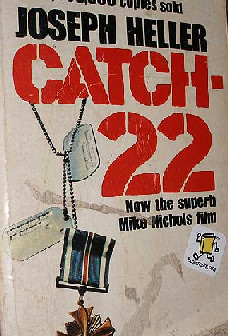
I actually read this one as the first one, but it was prior to our blogging so I thought I would Catch everybody up. The majority of this information can be found on Lostpedia.com, butmostly because I added it, so I will do some copy and pasting as I do believe it is copyrighted to me :)
Catch-22 is probably the most entertaining story of all the books we have read in the club, in fact it may be one of the more entertaining books I have read in a long time. It chronicles the story of an Army pilot by the name of Yossarian, who is tired of flying missions and wants to simply go home. It is a humorous satire on the military, government and all around leadership. The very idea of a Catch-22 has to do with being in a "damned if you do-damned if you don't" situation, which is a very obvious in LOST even prior to the episode actually titled "Catch-22". In this episode, Naomi, is found crashed on the island from a parachute and in her backpack a copy of the book Ardil-22 (Catch-22 in Portuguese) is found. There are many similarities to the episode as well as to the narrative. Here are a few we found:
- Like in Lost, one of the main themes deals with the characters wanting to escape from an island and go back home. Though not literally trapped on the island, as in Lost, the island Pianosa in the book is the squadron's base of operations, and the characters are just as inescapably tied to it. Another similarity is the non-linear structure and the flashbacks within flashbacks and the no clear distinction of "real-time events." Also, with each flashback, the viewer gains greater detail into the plot of Lost.
- The very name of the book catch 22 comes from an idea in the book that the characters are in a "damned if you do damned if you don't" situation. The soldiers, Yossarian and company, are only able to stop flying missions if they are deemed insane, however they have to be insane to continue to fly the missions in the first place. Therefore if they are found insane, they are found fit to fly, and if they are not insane, they are naturally fit to fly. The same can be said in many episodes and situations in the show. For example, Sun has to speak English to Michael in order to save her husband in House of the Rising Sun, which jeopardizes her marriage. Jack must choose between saving Boone or Joanna in White Rabbit. Even more obviously in the episode "Catch 22", Desmond knows Charlie is going to die and has to choose between saving him or possibly, in his mind, allowing Penny to come to the island.
- Another Catch-22 situation is found in the episode D.O.C.. Sun is confronted with two possibilities. One, that her unborn child is fathered by Jae Lee before coming to the island, which would in turn ensure that she live through the pregnancy. Two, that the father is Jin, who she has grown to love all over again, yet the baby would have been conceived on the island causing the death of the baby and herself. Both situations have very damning consequences as well as silver linings, thus a Catch-22.
- In the book Catch-22, the main character Yossarian is given a choice in the end to either go home, off of the island they are stationed, and essentially send his squadron off to fly more suicidal missions, or to stay and fight along side them and reveal the truth about the Generals who were keeping them on the island. This very same decision is placed in front of two characters in Lost. Michael is given the decision in ? to free Henry Gale, AKA Benjamin Linus and shoot Ana Lucia and Libby to get him and son off the island. He takes it. More similar to Yossarian, Jack is given the same decision to save Ben through surgery and get off the island or save his friends. Jack, like Yossarian, opts to take door number 3. Yossarian runs away to Sweden while Jack opts to slice Ben during surgery and demand his friend's freedom.
